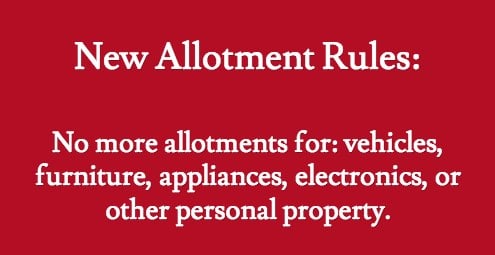
The Department of Defense recently announced sweeping changes for when they will allow military members to use allotments from their base pay. Starting January 1, 2015, the military will no longer allow active duty servicemembers to use allotments for personal property purchases, including purchases of:
- Vehicles, including cars, trucks, motorcycles, and boats,
- Household goods such as furniture, appliances such as washers and dryers, refrigerators,
- Electronics, such as laptops, tablets, cell phones and televisions; and
- Other consumer items that are tangible and moveable.
According to the DoD website, “Allotments still can be used for savings account deposits, investments, to support dependents, pay insurance premiums, mortgages, rents, make Combined Federal Campaign contributions, and U.S. government debt repayments.”
Servicemembers will also be required to certify under the UCMJ that the allotment is not for “the purchase, lease, or rental of personal property of or payment toward personal property.”
This will not affect current allotments, or those made before January 1, 2015. Additionally, these rules only apply to active duty service members, and not retirees or DoD Civilians.
Officials Cite Protection for Servicemembers as the Reason for Changes
The driving force behind these changes is to protect servicemembers from unscrupulous retailers and lenders who take advantage of military members and their families. In fact, DoD officials almost went a step further and banned all allotments, regardless of the purpose. In the end, they decided to keep the allotment system in place because servicemembers use them for sending money to family members and other purposes.
The main goal was to prevent servicemembers from being taken advantage of through high priced loans, and loans without clear disclosure of all fees. This includes loans such as payday loans, and high-priced consumer goods.
I’ve seen some examples of this first-hand, as I knew a young servicemember (E-2) who was talked into buying a car with an interest rate over 19%. The dealership even filled out the allotment paperwork for him. He should have known better than to buy a car he couldn’t afford, but the dealership also made it easy for him when they filled out the allotment paperwork and told him to take it to his finance department.
Are Allotments Even Necessary These Days? Allotments are convenient, but are they necessary? Most banks make it easy to set up automated payments from your account. You can do this quickly and easily at most banks. Here are some recommended military banks if your bank doesn’t offer these features.
But I see how allotments have a use – especially when it comes to sending money to family members while deployed, paying child support or alimony, and making sure certain payments are taken care of each month without having to worry about them.
Will new allotment rules fix the problem? I understand the reason for the new rules. Scrapping the allotment system for personal property purchases will add a barrier for certain loans. But I don’t think it will solve everything. The key is financial education. And that is something that unfortunately, is lacking in our school systems, and in the military. Until financial education becomes a priority, we will still have servicemembers who struggle with poor financial decisions.



Comments:
About the comments on this site:
These responses are not provided or commissioned by the bank advertiser. Responses have not been reviewed, approved or otherwise endorsed by the bank advertiser. It is not the bank advertiser’s responsibility to ensure all posts and/or questions are answered.
Juan Morales says
Ryan,
Thank you for your service, and for putting this information package. Really appreciate folks, like you for going the extra mile.
V/r
Juan
Joseph Hogue says
Too bad. It seems that a lot of little things like this are being cut or restricted lately. Been a little over a decade since I got out but I counted on a lot of these little benefits.